One of the main reasons you get bloated might be the foods you eat. Some foods, especially those with lots of sugar, fats and gaseous substances, are known to cause bloating. It is important to note that there are other factors that will predispose you to this bloating. For this article, the discussion centers on the worst foods for bloating. Basically, this is what you should not eat when your stomach feels swollen.
Foods that cause Bloating
Grains/ Cereals
Barley is a commonly consumed cereal grain. It has a lot of nutrients as it is rich in nutrients. It has a lot of fiber and also has large amounts of vitamins and mineral salts like molybdenum, manganese and selenium. It also contains gluten which can bring about intolerance in some people and hence bloating in the end result.
Another one to consider is rye. It shares similarity with barley. It is very nutritious and a good source of fiber, manganese, phosphorous, copper and B vitamins. It also contains gluten which is a protein known for intolerance in various people. The high fiber and gluten content in this grain are therefore the key reasons for bloating.
In addition, wheat also contributes to bloating. This is an ingredient in most locally consumed foods. Despite controversy over its stomach effects, it has been shown that it can lead to symptoms of bloating, gas, diarrhea and stomach pain in those who are gluten intolerant.[1]
On the contrary, rice could help you deal with bloating effectively. It is a grain that has a high content of fiber. As discussed above, it came out that fiber is one of the factors that could make you to have bloating.
To slightly differ, the American College of Gastroenterologists puts it that rice and rice flour make a good substitute for starches like wheat, oats, corns and potatoes. Rice is fully digested in the small intestines, giving it the least potential to form gases in the gut.
Recommended reading
- Best anti bloating foods
- How to get rid of period bloating
- Best Over the Counter Medicine/ Anti Bloat Pills
Lentils
They contain high amounts of fiber, proteins and healthy carbs as well as some minerals like iron, copper and manganese. Due to the high amounts of fiber contained, they are likely to bring you bloating if you are very sensitive. This holds if you are not used to eating fiber. Therefore, it is good for you to soak the lentils before you eat as this makes it easier for your digestive system.
Beans
Beans contain a high amount of healthy carbs. Apart from that, they contain high amounts of fiber and other minerals and vitamins.
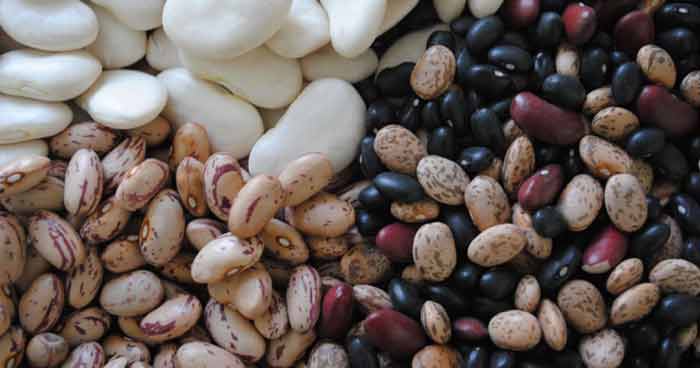
On the other hand, most beans contain a sugar known as alpha galactosides, which is in the class of carbs called the FODMAPs (fermentable oligo-, di-monosaccharaides and polyols). These are short chain carbs that escape digestion and then ferment in the colon giving rise to gas.
Broccoli and other cruciferous vegetables
These vegetable family contains many essential nutrients like fiber, vitamins C, vitamin K, iron and potassium. They also contain the FODMAPs and so, the likelihood of causing bloating is very high. You should cook them to make it easier to digest.
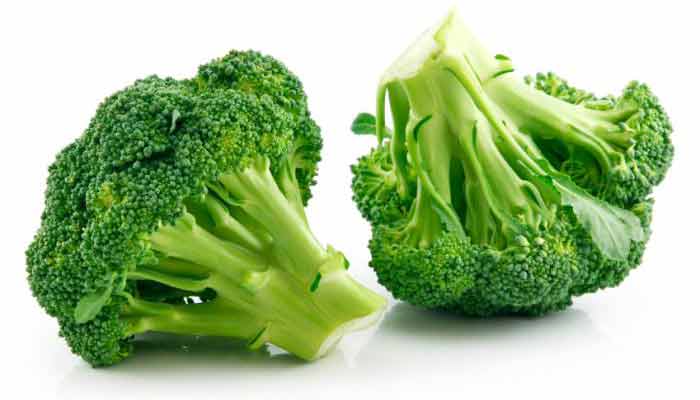
Cucumbers are on the contrary equally good to deal with bloating. This is because it has been seen that it is a good belly flattening vegetable. They have high water and low fiber content and this causes increased urination, relaxed and hence reduced bloating. [This is according to Kristin Kirkpatrick, manager at the Cleveland Clinic wellness institute in Cleveland, Ohio]
Onions
In as much as they are eaten in small quantities, they contain compounds called fructans. These are soluble fibers that have a lot of ability to cause bloating.
In addition they cause bloating in some people who are intolerant, especially in those who are intolerant. You ought therefore to cook the onions well in order to reduce digestive effects.
Dairy products
They contain a lot of nutrients as well as a lot of protein and calcium. However, a big part of the world population is unable to break down the lactose contained in milk. As a consequence, there is lactose intolerance, which is a key predisposition to bloating.
Apple
They have high contents of fibers, vitamin C and some antioxidants. There have been studies and evidence that apples are known to cause bloating. This is because they have an additional fructose that could cause fermentation in the large intestines and hence bloating.
Sugar alcohols
These are sugars used to replace sugar in sugar free foods and chewing gums. The common type is xylitol, sorbitol and mannitol. They are also in the group of FODMAPs. They in most cases tend to cause digestive problems as they get to the large intestines unchanged and the gut bacteria feed on them, leading to fermentation and hence gas formation.
Beer
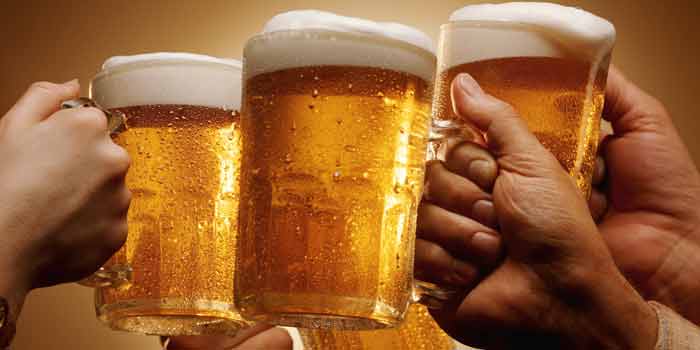
This is a carbonated beverage that is made from fermentable carbs like barley, maize, wheat and rice along with some yeast and water. Therefore, it contains both gas and potentially fermentable products that are bloating agents.
Watermelon
This is naturally sweet fruit that has a high amount of fructose. According to Julia Greer, MD an assistant professor of medicine at the University of Pittsburg, it has roughly 30 to 40 percent of people cannot fully absorb fructose. This in the long run leads to bloating, gas and at time diarrhea may result.
However, for individuals who can absorb fructose, it can act as an anti bloating fruit. This is based on the fact that it contains plenty of water.
Yoghurt
It contains varying levels of sugar molecules lactose that gets fermented in your body and this creates gas bubbles and bloating. This however does not conclude that all yoghurts are agents of bloating.
Some yoghurts like the plain yoghurt has very little amount of sugar of about 12 grams and plenty of proteins which is better. In addition to proteins, some yogurts come with beneficial gut bacteria(probiotics) which help ease bloating and gas.
From the above discussion, it is rather evident that yoghurt leads to bloating due to intolerance. A different observation indicates that consuming it a regular basis leads to intake of live cultures that increase lactobacillus and bifidobacterium which are called the good bacteria in the digestive tract. The bacteria facilitate efficient digestion and prevent belly bloat in the long run.
Fatty foods
Eat a large amount of foods that are full fat can make your stomach to empty very slowly. This is according to the National Digestive Diseases information Clearinghouse. This in the end result brings about bloating.
Salty foods
Salt has a large amount of sodium, a mineral that your body needs, which most American over consume salt, according to the American Heart Association.
Sodium holds excess fluid in your body and this causes bloating and subsequently leading to raising the risks of heart disease if you take in too much.
To reduce sodium related bloating, then cut down on the consumption of foods that have a high content of potassium such as canned soups and vegetables, roasted ham and frozen foods.
Junk food
They are packed with a lot of fat, sugar and sodium. These combination is very hard for the body to digest. This is because the body lacks the necessary machinery to digest these components. This in the end makes the body to get overwhelmed and hence leads to a lot of bloating.
Refined carbohydrates
They occasionally have white flour, which is very hard for your digestion. Processed wheat is not easy to break down in that it in the long run forms a buildup within the system responsible for wheat intolerances that comes with bloating.
Chewing gum
It makes the stomach to ready itself for food. As food is does not enter the stomach, digestion is often upset and certainly gas is created. This is not related to the gas that you swallow in the process of chewing the gum.
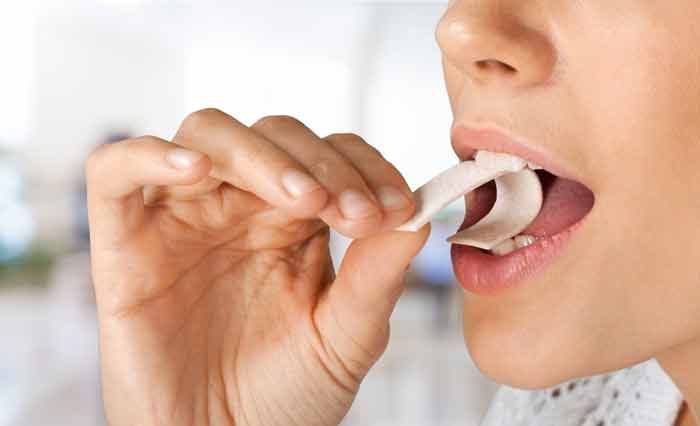
Spicy foods
They have been shown to enhance the release of stomach acids and hence cause a lot of irritation. You ought to therefore limit the consumption of nutmeg, cloves, black pepper, chili powder, curry, garlic, onion, BBQ sauce, horseradish, and vinegar and tomato sauce.
Too much fruit
Fruits have a lot of fructose. Just the same way you could be intolerant to lactose, it is likely that you might be intolerant to fructose. This is because your body does not produce the enzymes that are needed to digest this sugar.
It is therefore better that you choose lower fructose fruits like sweet melon and apricots as well over others like bananas and apples. Also, you should consider taking fruits separately from one meal either half an hour before or at least 2 hours after meals.
Some fruits are however good when you want to deal with bloating. One of them is papaya. This is a fruit just like the ones discussed above in the factors that lead to bloating. It contains milky substances that could be fed on by the gut bacteria to bring about bloating. However, a study in 2009 showed that it contains papain and when ripe, it is a mild laxative which helps in the movement of the bowel.
Nut milks
Many display stands have varieties of the almond milk that have the thickening agent carrageenan that is derived from the seaweed and has been associated with gastrointestinal issues like ulcers. You should therefore try homemade nut milk.[2]
Granola bars
This is a common ‘healthy’ snack bar that are protein isolates derived from soybeans. It is one of the most gas inducing culprits. You should be sure to read the label and ensure that any protein you take from the bars comes from the seeds or the nuts.
Dried fruits
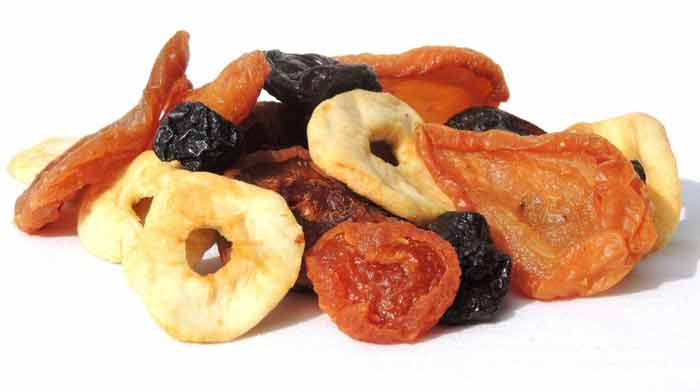
They have high fructose elements and this is not friendly if you have a sensitive stomach. You may find it very difficult to digest and hence get bloating. On the hand, you should choose berries and fresh citrus that are lower fructose fruits. Therefore, choose your fruits very wisely.[3]
Pro-inflammatory Fats
The dietary fats that are related to inflammation and may contribute to bloating include:
Saturated fats (seen in animal products like red meat)
Trans fats
Omega-6 fats (seen mainly in poultry, nuts, vegetable oils and wheat).
Brussels Sprouts, Kale and Cabbage
These vegetables are all rich in fructans that are poorly digested in your gut and can ferment in your stomach. If you have a very sensitive stomach, then you are likely to experience one broad range of symptoms, such as abdominal pain and discomfort, changes in bowel habits, bloating, heartburn, over fullness and nausea.
You should avoid eating these vegetables raw. Consume them very well fermented or steamed for optimal nutrient absorption as well as digestion.
Inasmuch as the consumption of vegetables like Brussels sprouts, which are filled with nutrients that eventually lead to bloating, leafy ones like the kales, spinach and lettuce have proven to help ease water retention. This is because they have fiber[4] and as a consequence, they end up reducing the likelihood of you getting bloating.
Eating High-Fructans Foods
Generally, fructans are a fiber type and are useful to your digestion (keeping regular bowel movements) as well as overall health. But as those fibers are by definition indigestible by the human body, they may cause bloating and flatulence basing on the bacteria of the gut
Based on the above discussion, you can draw a conclusion that there are some foods that are known to cause bloating, but at the same time could help reduce the harmful effects of the bloating.
The bloating can at times be individualized in that some people can get while others are not affected.This is so if you are allergic or intolerant to some component in some food. You are unique and hence different from another person in terms of tolerance. This is mainly so because we have different enzymes and therefore digest food differently.
The only best thing that you ought to do in order to avoid the likelihoods of getting bloating is to see your nutritionist or dietician for the proper guideline and advice on the best food combinations that you can partake. You should be extra cautious especially when you have lactose intolerance.
Sources/Refences
[1] http://www.nhs.uk/Livewell/digestive-health/Pages/beat-the-bloat.aspx
[2] http://www.eatthis.com/bloated-stomach
[3] http://www.webmd.com/diet/features/10-flat-belly-tips
[4] http://www.healwithfood.org/bloating/foods.php



